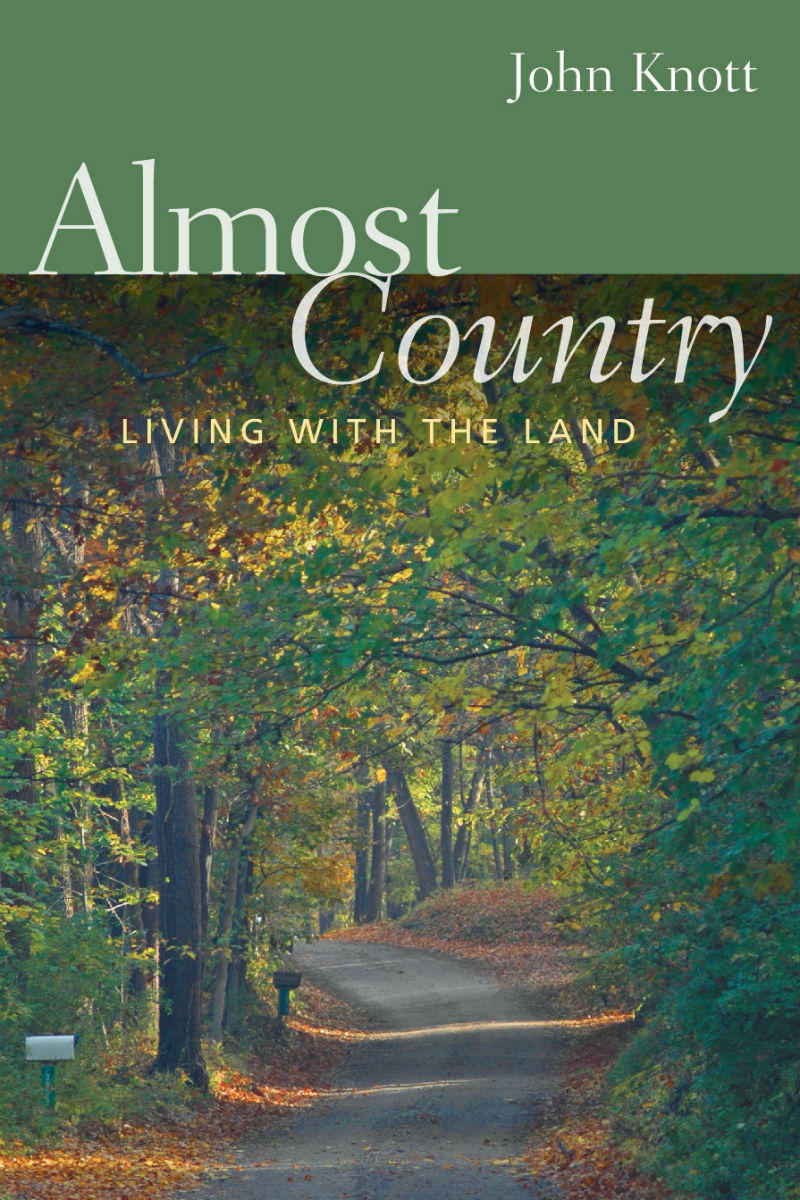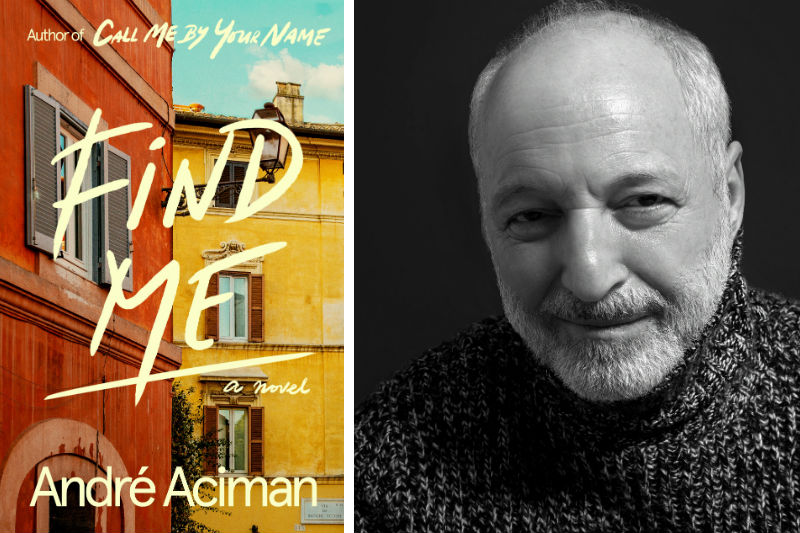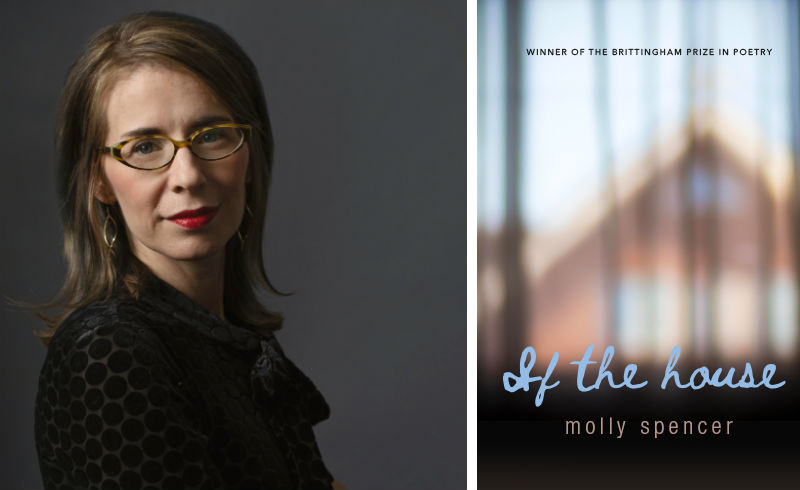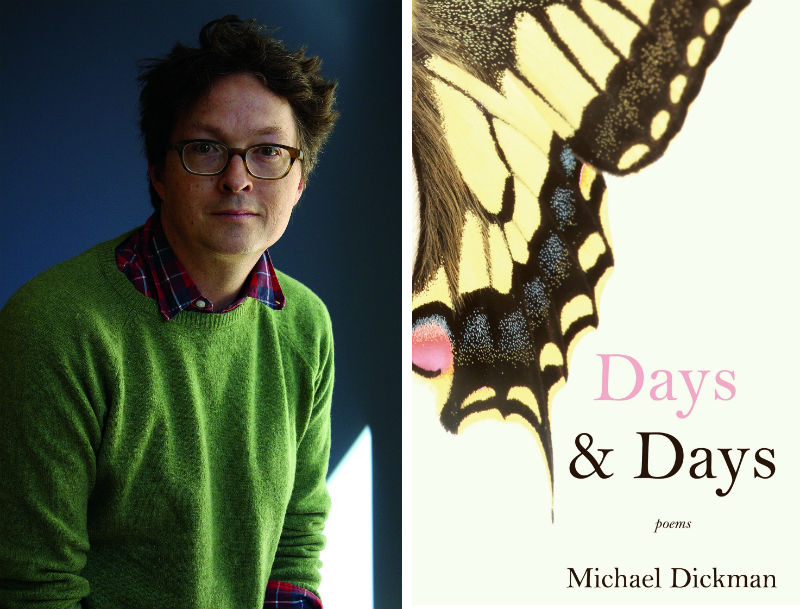U-M grad Chris McCormick's novel "The Gimmicks" meditates on relationships, wrestling, and the Armenian Genocide through altering perspectives

While the cover may show a picture of two opponents in a wrestling hold, The Gimmicks by Chris McCormick is about far more than matches. The novel chronicles the stories of Ruben Petrosian, Avo Gregoryan, and Mina, how their lives intersect, and how they love and hurt each other multiple times.
Each character overlaps with the others in ways that are both fortuitous and disastrous. Ruben, small and jealous, first feels envious of Mina’s backgammon luck and then goes on to seek revenge for Turkey’s denial of the Armenian Genocide with the Armenian Secret Army for the Liberation of Armenia in the 1980s. Avo, large and kind, comes to live with his cousin’s cousin Ruben and his family in 1971, gets caught up in a ploy to be a part of Mina’s backgammon success, follows a request by Ruben to go to the United States, strikes off on his own as a wrestler, and finds himself misunderstood in several situations. Mina, lucky and earnest, garners success in playing backgammon, and while her luck holds in some ways, she experiences various losses throughout her life. Terry Krill, Avo’s wrestling manager, reluctantly begins to recall his past and piece together the others’ stories 10 years after the fact in 1989.
Their converging lives are told through chapters grounded in particular times and places and through the reflections of these people. During a reunion between Mina and Avo, she tells him, “Our lives aren’t metaphors, halved or broken or split. Our lives are our lives, whole if they feel complete, whole if they feel incomplete.” Her message generalizes the agonizing challenges that they encounter. Good intentions might not be enough or allow them to fulfill their desires.
Early in the novel, Mina muses in a journal: “That the world is round makes me hope that time is round, too, and that maybe I’ll loop to the start one day.” At that unexpected reunion with Avo later, “she felt the muscles in her face mirroring his, signaling a blue smile of her own, and she knew all at once about the roundness of time.” Such parallels and recurring ideas appear throughout the book -- similes and metaphors rewarding for the reader. Another is when Mina’s husband recalls the story of his first wife and mother: "He defended one to the other with all of his heart, so that he ended up without the trust of either.” Similarly soon after, Mina accuses Avo of being caught between two people, of being "someone who confused love for something you could only loan out to one person at a time." These threads bring the characters’ stories that sprawl across time and countries together with poignant and harsh realities.
McCormick, also the author of the earlier short story collection, Desert Boys, grew up in California and graduated from the University of Michigan with an MFA. He teaches at Minnesota State University, Mankato.
McCormick visits Ann Arbor to read at Literati Bookstore on Friday, January 10, at 7 pm. I interviewed him ahead of time.
U-M Emeritus Professor John Knott recounts adventures of semi-rural Scio Township life in a new nonfiction essay collection

Occasionally you get a good look inside another life. It could be seeing a career other than your own. It could be hearing about a trip to a place where you’ve never been. It could also be learning about a distinct lifestyle chosen by another person.
John Knott’s new book, Almost Country: Living With the Land, reveals the latter. In this 147-page self-published collection of nonfiction essays, he outlines his experiences with building and living in a home in the woods outside of Ann Arbor with his wife, Anne. Anyone with an interest in construction, wildlife, ecology, native plants, and trees, land ethics, local politics, and stories about ways of living might appreciate these essays.
Their house was situated on about three acres near the Huron River and just far enough outside of the city that they experienced a closer connection to the natural world while still enjoying a quick drive to Ann Arbor. As Knott writes, “We would find ourselves learning to appreciate darkness and quiet more absolute than anything we had experienced in town.”
The Knotts moved to their home in Scio Township in 1992 after their children left the house and as a way to pursue their interest in environmental issues. In 2006, Knott retired from the University of Michigan, where he taught and led in academic administration and is now Professor Emeritus of English. He focused on English Renaissance literature before turning his attention to literature and the environment.
One recurring thread throughout Almost Country is the question of how to maintain a landscape. The Knotts made a strong effort to give preference to native plants. Striking a balance between aesthetic and ecological principles presented both a challenge and goal for them, as Knott contemplates the question, “Restoration to what baseline?” in the book.
Wisconsin indie-folk band Dead Horses look to the moon and Midwest for inspiration

Music from the indie-folk and Americana band Dead Horses grapples with hope and pain -- how to reconcile sorrows and desires -- through both songwriting and sound. Lyrics on the 2018 album, My Mother the Moon, draw on frontwoman Sarah Vos’ life story, including experiencing an unsettling childhood and finding her way as an adult, as well as her observations as a musician. The track “Turntable” offers this image:
Oh, she said, “If my heart was a turntable,
And my belly was the speaker and my soul the needle.”
These are the kind of songs in which you can hear something new each time you listen. Finding autonomy and self, acknowledging hurt and struggles, recognizing social issues, interacting with nature, and looking hopefully to the future all figure into this album.
Most recently, Dead Horses, started by Vos and bassist Daniel Wolff, is releasing a series of singles, which will appear on an EP next year. Their latest one, “Birds Can Write the Chorus,” embraces possibility, as “it’s never what I thought it was; it’s never too late,” according to the lyrics.
Dead Horses play The Ark on Wednesday, December 4, with doors opening at 7:30 pm and the show starting at 8 pm. Vos and Wolff responded to questions by email beforehand.
Malcolm Tariq's poetry book, "Heed the Hollow," examines blackness, queerness, and the South

To say that Heed the Hollow by Malcolm Tariq is about the queer black experience is both true and also too simple. The poetry collection engages with the American South, the history of slavery, and sexuality and eroticism in candid, unexpected ways.
In the introduction, Chris Albani, who selected the book for the Cave Canem Poetry Prize, aptly illuminates what this book does, writing, “This is where we find Malcolm Tariq’s work, on the cusp of a new south, a new Black, a new self-love, a new history. He is one of a new emerging crop of writers that is redefining Blackness in the United States….” The collection shares perspectives on this history and lineage in relation to today.
One of the poems -- a cento that borrows lines from other places -- states, “We give narrative to experience every day. Being born and living lawfully in my / humanness, I live a reality denied to the enslaved and formerly enslaved.” This contrast between today’s way of life and the not-too-distant past offers insight into how this country’s history still shadows the experience of the present.
In "Find Me," author André Aciman resumes the stories of characters from "Call Me by Your Name"

How do we know if we are fully living our lives? Does asking that question mean that we are not?
Find Me by André Aciman is a novel obsessed with these questions. Its characters find such great love that they feel as though they had not been living previously. This book also continues the stories of Elio and Oliver, among other characters, which first appeared in Call Me by Your Name, Aciman’s 2007 novel. While reading Call Me by Your Name before Find Me would provide helpful background, you can enjoy Find Me without having read the other book, as I read Find Me first for this interview with Aciman and then Call Me by Your Name after.
Aciman is a professor at the Graduate Center of the City University of New York and lives with his wife in Manhattan. He will be in conversation with Zahir Janmohamed and also answer audience questions at Rackham Auditorium at the University of Michigan Saturday, November 9, at 7 pm in a ticketed event by Literati Bookstore.
In the four-parted Find Me, the first section focuses on Samuel, who is Elio’s father and receives a bigger role than in the previous book. On the topic of whether someone is truly living, Samuel reflects, “Some of us never jumped to the next level. We lost track of where we were headed and as a result stayed where we started.” As he interacts with Miranda, a woman he meets on a train, he muses about embracing life and how conversely, “Perhaps going about one’s daily life with all its paltry joys and sorrows is the surest way of keeping true life at bay.” This concern becomes not only a call to action and attention for Samuel as he comes to this awareness while his relationship with Miranda simultaneously grows, but also a theme as other characters reconsider their lives in subsequent parts of the novel.
The next three sections of Find Me center on other characters -- Elio, Oliver, and Elio again -- in their first-person voices, and they pick up what has happened in their lives since Call Me by Your Name. The subject of how to live gains more nuance as those characters discuss who they have been, who they are now, and how they have changed over time. Michel, Elio’s lover, says to him, “I suspect we have first selves and second selves and perhaps third, fourth, and fifth selves and many more in between.” He recognizes how, at different times and places in life, we are different people, and then later we are no longer those people. This concept becomes especially poignant between Elio and Oliver.
Not only do people evolve during their lives but they also reveal unique parts of themselves in different relationships and situations. As Samuel says to Miranda, “Most of us never meet those who’ll understand our full rounded self. I show people only that sliver of me I think they’ll grasp. I show others other slices. But there’s always a facet of darkness I keep to myself.” Find Me is also clearly preoccupied with who we are and how we know -- and are known to -- others.
The events and musings of characters in Find Me expose the situational nature of relationships and also embrace intensity and sensuality, though it may be hard to believe the ways and speed in which relationships progress. Fate plays somewhat of a role in bringing characters together, but the novel suggests that the characters’ choices and desires have a bigger effect on their lives. At so many points in the relationship between Samuel and Miranda, or Elio and Oliver, someone chooses or chooses not to say something, or they get scared and bolt. Yet, they discover a greater life when following their desires.
Aciman answered some questions from me before his visit to Ann Arbor.
Poet and U-M writing instructor Molly Spencer sees the world "as a collection of thresholds" in her new book, "If the house"

Throughout Molly Spencer’s new book of poetry, If the house, each measured word reveals the intensities and scenes of home, time, and solitary experience amidst people and relationships. In a poem titled “How to Love the New House,” there is a line that answers, “Until you ache with it.” Another poem, “As if life can go on as it has,” includes the sentence, “The earth has all these endings,” and the speaker goes on to share, “I am / in a kitchen’s heavy afternoon / light,” almost implying that the sun could indicate a conclusion.
Perhaps most consistently, the passage of seasons prominently delineates time in If the house. Early on, a stanza depicts time’s effects through apples and squash:
Given time, they will ripen,
grow sweet, become something
for you to get by on.
It seems that time offers sufficient sustenance to keep going and also that time keeps independently moving, resulting in byproducts like sweetening. Later, the lines, “It’s December” and then “October and the birds flock / and rise, whole-cloth” appear in different poems. So months also mark time in this collection, along with other indicators, such as, “My body / adds itself again to the unfolding / rooms of time,” and there are “...other Augusts far / from here, but not so far you can’t / reel them back in....” Each moment is clearly fixed to others by virtue of time being linear, but life in this poetry collection’s world still changes and shifts, showing contrasts to previous points in time to which the speaker remains connected.
Eileen Pollack's "The Professor of Immortality" novel explores science, tech, grief, motherhood, whether we can truly know another person -- and the Unabomber's time in Ann Arbor

The Professor of Immortality by Eileen Pollack is preoccupied with how well people can know each other and how they deal with flaws and surprises in relationships when they care about the other person. The book raises questions about whether it is better to be together despite challenges and what the costs are either way. The ending seems to point strongly to an answer yet still lets the reader wrestle with this matter.
Main character Professor Maxine Sayers has an energizing job, loving husband, quirky child, and comfortable home -- until she doesn’t. Her husband dies unexpectedly, and then she experiences issues with her existing family members as her son becomes inaccessible and her mother’s health deteriorates. Through all of these changes and problems, the novel delves into Maxine’s thoughts and feelings about the goings-on. She must contend with whether what she believed and worked for is right and if it is what she still wants.
As Maxine takes action to figure out is transpiring with her son and a former student, she reflects deeply on her life and connections to people. At one point while talking with a friend and colleague, Rosa, Maxine wonders how to cope with her concerns, and she experiences some relief from Rosa:
[Rosa] settles beside Maxine and rubs her back until Maxine is crying in her arms. That’s all anyone wants, isn’t it? To be held? Isn’t that the best Terror Management System any of us has devised?
This passage feels poignant in and of itself and becomes even more weighty with the fact that the book draws inspiration from Ted Kaczynski, the Unabomber. Another character, Angelina, provides further insight, noting that for many, “‘…their troubles are because of what is missing in their lives. And there is no way you could make up for that.’” These insights buoy Maxine when she faces what she fears is true and makes difficult decisions as a mother.
Pollack previously directed the MFA Program in Creative Writing at the University of Michigan (U-M), and she has written numerous books, including the recent novel, The Bible of Dirty Jokes. Now she lives in New York City. Ann Arbor welcomes her back Friday, October 11, at 7 pm at Literati Bookstore, where she’ll be in conversation with author Natalie Bakopoulos. I asked her some questions beforehand.
Beer captivates and divides a family in J. Ryan Stradal's new Midwestern saga, "The Lager Queen of Minnesota"

Beer and pie remain constant for characters through rifts, tragedies, and changes in J. Ryan Stradal’s new book, The Lager Queen of Minnesota. The novel follows two sisters, Helen and Edith, as they come of age and make lives for themselves. Yet their paths diverge when Helen taps their father for all the money from the sale of the family farm, which divides the family. Edith becomes known for her pies, hops between service industry jobs, and endures several major losses, all while bottling her feelings about the uneven inheritance. Helen pores over chemistry and learns to make beer in college, and then she grows a large, successful brewery with the help of the farm proceeds. When Edith’s granddaughter, Diana, inadvertently enters the beer business, their paths head toward each other again.
Chapters in this plot-driven yet poignant novel alternate the focus between characters and are titled by various sums of money exchanged within them. The backstory and present lives of the three female main characters are blended throughout the chapters as Diana’s story parallels Helen’s in some ways. It is not only about what is happening or has happened, though. The novel also lingers on nostalgic or emotional moments. When Edith loses her husband, Stanley, the narrator describes that:
Her grief was a forest with no trails, and she couldn’t guess how long her heart would walk through it, as her body walked other places. For half a century, she had seen or spoken with this man almost every day, so his life didn’t end when he died; it found its way into cereal aisles and intersections and post office lines and conversations she didn’t intend.
It’s clear that Edith cares deeply about those around her even as she struggles to get by.
The characters don’t succumb to bitterness despite challenges to support themselves, and they celebrate their successes in an industry that fluctuates based on consumers’ preferences. Beer aficionados and foodies might appreciate the well-crafted descriptions of brewing methods and tasting notes. One passage describes “Grandma Edith’s Rhubarb-Pie-In-A-Bottle” ale as such:
The beer has a fluffy pink two-finger head and smells like malty rhubarb, so it’s certainly not out to fool anybody. ... This beer is flawed, wonderful, and strange in a way only a certain individual could devise, and it renders every other beer on the shelf a faceless SKU.
This review of her beer illustrates Edith’s and other characters’ work ethics and distinct Midwestern traits.
Stradal has first-hand knowledge of the setting, as he grew up in Minnesota. He now lives in Los Angeles and is a contributing editor at TASTE, an online magazine about food and cooking. His first novel is Kitchens of the Great Midwest. He reads at Literati Bookstore on Tuesday, September 24, at 7 pm, and I interviewed him ahead of time.
Poet, Princeton lecturer, and former Zingerman's employee Michael Dickman accounts for days line by line in new collection

Days go by in many sorts of ways: hectic, enjoyably, dragging, intensely, calmly, explosively, gratifyingly. They can take on not just one but a range of characteristics. I am convinced that poet Michael Dickman goes through his days attentively if his poems are any indication of how he lives.
Drawing on nature and circumstances, Dickman’s new collection, Days & Days, reveals observations about parenthood, television, love, hotel stays, prescription drugs, and bodies of water. The poems are associative. Lines next to each other may seem unrelated and abstract at times, and then a line a few pages later will relate to a previous thought. The longest poem, “Lakes Rivers Streams,” reads:
This is the earth & sometimes the earth
changes color
Now I remember they were horses mulching the backyard
The horse metaphor for children continues:
My horse kids eat something off the ground I can’t quite make out
and
What should I do with their withers & fetlocks what should I do with
their dressage?
A parade is nice
These lines capture the variety and vicissitudes of days, whether with children or other topics. One wonders if Dickman is constantly jotting down fragments as he goes through his days and later fits them together into cohesive poems.
Formerly of Ann Arbor, Dickman now teaches at Princeton University. He reads at Literati Bookstore on Friday, September 20, at 7 pm. I interviewed him prior for Pulp.
Rachel DeWoskin's "Banshee" follows a woman exploring impulses and freedom after a medical scare

Rachel DeWoskin's Banshee is a novel about Samantha Baxter, a woman who faces a serious medical diagnosis and casts about for meaning while acting out in ways inconsistent with the life she has lived so far. She crosses lines in her job as a professor and her roles as wife and mother. Through it all, she recognizes the incongruencies of her actions, but she does not just plow ahead disrupting her middle-aged life; instead, she both makes her choices and contemplates how they unfold.
While her actions appear extreme, ranging from sleeping with a student to alienating her husband, Samantha does not leave her life and home. Her defiance centers on how she acts within her existing family and professional relationships. Samantha says what she wants to, unapologetically follows her impulses, and lets the consequences unfold. Accordingly, the prose consists of her first-person narration of her experiences and perspective as she transforms and reacts to her major health problem and to how she feels in new situations. The plot becomes about what she does or doesn’t do, what she says or doesn’t say, and what she thinks and feels about all of it.
Writer, poet, and Ann Arbor native DeWoskin previously acted in a Chinese soap opera and now teaches at the University of Chicago. She will speak about and sign Banshee at Literati Bookstore on Monday, September 9, at 7 pm. Beforehand, I interviewed her about her writing and new novel.


































